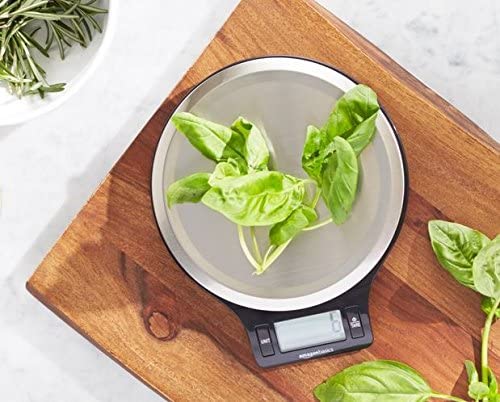This device will help you obtain the necessary food portions that you require to prepare the most exquisite meals and the best desserts so that you no longer have to deal with an endless number of measuring containers.
So we have created a list of the best kitchen scales on the market today, those that will not only be your ally in measurement but can also offer you many other extra features. In this way, you can choose the one that best suits you in terms of size, design, resistance, cost, and more.

The Important Things
A kitchen scale is an ideal appliance for those who need to weigh and constantly measure food products, mainly. That way you can keep control of your intake and prepare your recipes in a much more practical way.
There are modern versions whose functionalities will facilitate the process, such as their resistance, depending on the material with which they are created. The weight that it represents, and that must be compatible with the use that you will give it and its space in your kitchen, and the difficulty of cleaning that it may have.
Before buying the first option in sight, it is important to evaluate which one best suits your needs in terms of mechanism, battery usage, weight capacity, and device size.
Ranking: The 3 best kitchen scales
From the wide list of options from which you can choose, we selected those 3 whose functionalities concerning price – resistance – size stand out among the others. We hope they are useful.
Etekcity Digital Kitchen Scale

At this time the commented product is not available from the supplier. That is why we have replaced it with another with similar characteristics.
This model can weigh up to 5 kg with its stainless steel platform, which allows for easy cleaning and maintenance. Its compact design allows for easy portability and storage and includes 2 AAA batteries for immediate use. Helps save battery thanks to its automatic shutdown system after 2 minutes of non-use.
Its tare function allows the scale’s weight to be reset to zero when a container is placed on it, for accuracy in the final weight. It also has a range of units from which you can select grams, ounces, pounds, and milliliters. You can buy it with the security provided by the 1-year Etekcity guarantee.
AmazonBasics Digital Scale

The AmazonBasics scale includes all the basic features you want. Its stainless steel design features an LCD screen to display the results in a comfortable and fast way, which will not be covered by any plate. With 2 AAA batteries, so you can start using it immediately and it is light and easy to move.
It can weigh from 2 grams to 5 kg in grams, ounces, and pounds. It also has the tare function to ignore the weight of the container. Thus avoiding dirtying several containers and starting to weigh what you add. Due to its metallic finish, we recommend taking care of the scratches that use may cause.
Ozeri, Digital Kitchen Scale

It is a model with a chrome-plated, solid, and resistant appearance for elegant kitchens, but with the lightness of plastic. Its platform is accompanied by audible buttons for confirmation of correct pressure. It has a battery-saving system that turns off the equipment once 2 minutes have elapsed without use, and it works with 2 AAA batteries.
The capacity of this scale is up to 5.05 kilograms and stands out for its accuracy. It also has the tare function to calculate the full weight of the ingredients without including the weight of the container. Results are displayed on a convenient LCD screen and cleaning and storage are easy.
kitchen scales shopping guide
Some may not see the need for a kitchen scale, but the truth is that its usefulness goes far beyond simply knowing the weight of the products we are consuming. Below we will tell you more details about them.

What is a kitchen scale and what advantages does it have?
Kitchen scales (mechanical or electronic) are instruments that will allow you to know the weight of a product. It is a device that includes a platform on which the product will be placed, either alone (fruits, vegetables, bread) or inside a container (liquids, grains, flour). This can have different uses, such as the creation of food or dessert recipes, the measurement to follow strict diets, or simply having some idea of the amount of solid or liquid food that you have or are going to eat.
Of course and like all products, its use brings with it a series of advantages and disadvantages that will accompany you during the use you want to give it. In the following table, we list the most relevant aspects that are worth taking into account.
Advantage
⇒ Precision when measuring the ingredients of your recipes
⇒ Diversity of sizes
⇒ Time saved by measuring all ingredients with one device
⇒ Variety of designs that match the kitchen
Disadvantages
⊗ Investment in batteries
⊗ Take up space in the kitchen
⊗ They require constant cleaning
⊗ Depending on the material, they can be weak against shocks or falls
Plastic, glass, or steel kitchen scale – what should you pay attention to?
It is important to know the useful lifetime that your equipment will have depending on the material that has been used for its manufacture. It can be a very weak machine, as well as a powerful and resistant one. Surely one of the elements that will define which kitchen scale you acquire will be its resistance and functionality. That is why we have prepared a table detailing the differences between these teams according to the material used for their creation.
Plastic: This is the most widely used material in the world and surely several of your kitchen elements are made with it. Plastic provides lightness and ease when cleaning and moving your products, but it can mean weakness and fragility, depending on how it has been used.
Glass: It is possibly the heaviest material of all, but it does not always mean that it will be the most resistant. A piece of equipment made of this material will possibly have a fascinating appearance in your kitchen, but you must take into account the difficulty of moving it, cleaning it, and repairing it in case of breakage.
Stainless steel: This is an infallible material for household appliances. Stainless steel is not only resistant but easy to clean and does not usually represent a significant weight as long as the object is of a standard size.
| Plastic | Glass | Stainless steel | |
|---|---|---|---|
| Endurance | Weak and may break or break | It can suffer cracks or breaks | Strong and scratch proof |
| Weight | Light | Heavy | Average weight |
| Cleaning | Easy to clean | Care in cleaning | Easy to clean |
How much does a kitchen scale cost?
Depending on the technology, year of creation, model, brand, material, and functionalities of the kitchen scale you wish to purchase, prices may vary. Those more basic digital scales, according to what we have mentioned, can cost approximately $10. However, these already include the tare system and many other functionalities so that cooks and pastry chefs can take advantage of them in an excellent way.
Other more resistant ones can cost $80, so there is not such a wide range. Of course, this happens if we talk about those for domestic use whose weight limit is 5 kilograms since if you want to buy a commercial or industrial scale, the costs could be close to $1180.
Where to buy a kitchen scale?
Virtual stores are always a good option when it comes to purchasing electrical appliances. Amazon offers are ideal for those who want to know everything related to the functionalities of the different products at the reach of a click. As with other options, you can find eBay, Mercado Libre, Costco, and the like. If you prefer face-to-face shopping, Walmart will always be a good option, as well as Informa, which has positioned itself as a leader in kitchen and household items. However, in physical stores prices could increase.
Compare and rate the different models of kitchen scales
Although various characteristics revolve around kitchen scales, it is important to know the most relevant when making the final decision. We remind you that there is no perfect product, but there will be the one that best suits your needs and requirements.
The main factors you should consider are the following:
- Mechanism
- Batteries
- Ability
- Size
Next, we will detail each one of them.
Mechanism
These can be differentiated between mechanics and electronics. Although electronic scales have displaced those of mechanical operation, you may come across one of them and doubt arises.
Mechanical scale: These are usually very resistant in both material and durability. However, they have their drawbacks when it comes to mobility and storage, and conversion diversity. They are useful when you want to give it a commercial or very continuous use since they will last for more years and will not drain batteries.
Electronic scales: They can be less durable, more fragile, and have a slightly lower accuracy range, but this is offset by their versatility in design, size, transport, and storage. In addition, the possibilities of conversions in different weight units give it a bonus if you use them in your kitchen.
Battery
If you decide on a digital scale, you should be prepared to get batteries and preferably have a backup in case they run out. Although some may be wired, most of them work with batteries that you will have to change once they are exhausted.
Most scales need AAA batteries, which are easy to get and cheap, plus the fact that you can place them rechargeable to avoid increasing expenses in the future. Others use CR2032-type batteries, similar to the flat ones included in watches, so they can be more complicated to locate.
Ability
Depending on the use you decide to give it, you will need scales with greater or lesser measurement capacity. Most of them have a range that varies between 1 gram and 5 kilograms of weight, so it could be perfectly useful if you want to weigh basic kitchen ingredients at home.
Now, if what you need is to give it commercial or industrial use, we recommend locating a scale manufactured for this purpose, which will be able to obtain much higher ranges, going through 35 kilograms of weight.
Size
The dimensions of your kitchen and your ingredients will be key elements to analyze. For example, if you have a narrow kitchen and will simply measure out small portions, look for more compact options.
If, on the other hand, you must weigh food in larger containers, you can choose those models whose size is larger and more comfortable for your use. You can find scales for private use of 24, 18, 14 centimeters, or similar.

